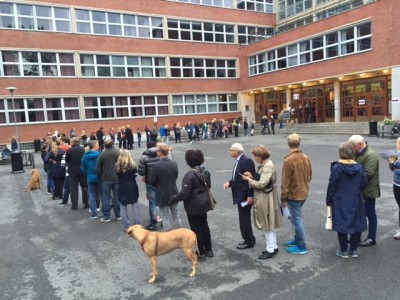Voters lined up on Monday to cast ballots in Norway’s mid-term local elections, and as returns trickled in, it became clear that some of the country’s biggest cities will be undergoing major political change. The small but blossoming Greens party scored a national breakthrough and will likely decide, for example, whether Oslo ends up with a conservative or socialist ruling coalition, while Bergen was already shifting from right to left.

One thing was clear: Close results in Oslo mean there will be lots of political negotiations going on between now and mid-October, when city governments need to be formed. Residents and voters aren’t likely to know who’ll be mayor or lead the local government until then.
Labour boasted that it had logged its best local elections in 30 years, taking over government power in Bergen and Tromsø and retaining power in cities like Trondheim, Hammerfest, Rælingen and Arendal, in some places with as much as 70 percent of the vote. Labour Party leader Jonas Gahr Støre claimed that Labour was “this election’s big winner” as he addressed cheering party faithful just before midnight.
The Conservatives hung on to power in Stavanger, but lost badly in nearby Sandnes, where Labour could boast its best results in 40 years. The party’s greatest loss was in Bergen, where a “political earthquake” left the Conservatives’ years of government power in rubble following months of political scandal and a feeling, in the words of one voter, that city leaders were “out of control.”
All told, both the Conservatives and the Progress Party did poorly, two years after they won enough votes in the national election to form a minority coalition government. When around 72 percent of the vote had been counted, the Conservatives had 22 percent and the Progress Party just 9.8 percent on a national basis, which combined was less than Labour’s 33.4 percent. Labour also won the most votes in 17 of Norway’s 19 county governments. “It’s allowed to be disapointed tonight,” Progress Party leader Siv Jensen told party members.
In Oslo, meanwhile, the race was too close to call and was more than likely to be settled by whichever side the blossoming Greens party (Miljøpartiet De Grønne, MDG) decides to support. The Greens reaped record strong voter support, lured away votes from others parties and were claiming nearly 9 percent of the results in Oslo as early results ticked in, prompting both Labour and the Conservatives to say that they will talk with the Greens about possible government cooperation.
Election ‘queen’ ready to be courted
The Greens’ top candidate for city council in Oslo, Lan Marie Nygen Berg, was dubbed the “queen of the election” by state broadcaster NRK and was smiling from ear to ear. “We have said all along that we will talk with everyone to get the best possible climate policies for Oslo,” Berg said. She and her party fellows have been firmly opposed to expanding the major E18 highway west of Oslo, for example, a position that will be difficult for either the Conservatives and Labour to accept. She and Greens leader Rasmus Hansson were both “ecstatic” over the election results, and will use their victory to demand “fundamental changes” from the other parties in return for their support.
Carl I Hagen of the Progress Party predicted “chaos” if Labour tries to form a city government with cooperation from the Greens, the Socialist Left and the Reds. Labour’s candidate for mayor, Raymond Johansen, “will get a lot of grey hair early,” Hagen quipped, calling on everyone to recognize that Fabian Stang of the Conservatives has been a popular mayor who should win their support. He even suggested that Labour and the Conservatives should team up and run the city together, if the chaos of quarreling small parties gets to be too much.
Mayor Stang ready to bow out
Stang, meanwhile, seemed to think his days as mayor of Oslo were numbered. “It would be unnatural to think, with the Greens holding the swing vote, that I will continue as mayor in Oslo,” he told NRK. “They (the Greens) can take the job, or either Labour of SV can have it.”
Stang said the Greens will now have to choose which side they’ll be on. He has said before that he thinks the Greens are much more of a socialist party, but the Conservatives’ candidate to lead city government (a position separate from that of mayor) seemed more open to bargaining with them. Stian Berger Røsland congratulated the Greens and said simply that forming a new city government in Oslo would now “take some time.”
newsinenglish.no/Nina Berglund

